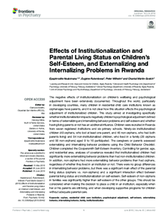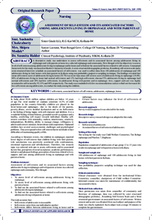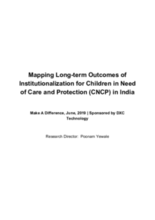Displaying 201 - 210 of 744
This study sought to understand how post‐institutionalized children interact with unfamiliar peers and the factors that predict the quality of these interactions in order to shed light on the processes contributing to the persistent, often increasing social deficits seen in post‐institutionalized children.
This open access article details a culturally informed approach by sharing the findings of a Cultural Healing Program (CHP) designed, developed and delivered by an Aboriginal Community Controlled Organisation. The program was for Aboriginal survivors of institutional child sexual abuse who had also experienced cultural abuse having been forcibly removed from their families as children and in the process disconnected from their communities, culture and land.
This study aimed at investigating specifically whether institutionalization impacts negatively children’s psychological adjustment defined in terms of externalizing behavior, internalizing behavior and self-esteem and whether having living parents has additional influence. Ninety-five institutionalized and 82 not institutionalized children in Rwanda, aged 9 to 16, participated in the study.
A descriptive study was undertaken to assess self-esteem and its associated factors among adolescents living in orphanage and with parents at home in a selected orphanage and community, West Bengal with the objectives to assess level of self-esteem among adolescents living in orphanage and in home and to find out the associated factors related to self-esteem.
This study analyzed how the implementation of the strategy of extending learning time in a group of adolescents living in residential care contributed to promoting their scientific vocations and increasing their academic expectations and their knowledge of these disciplines.
The goal of this research was to challenge or validate the assumptions that underpin existing impact and change focused solutions; to combat the complete dearth of data and lack of meaningful information available in the sector about the longer term effects of institutional care on children in India; and to enable programmes both within and outside of Make A Difference to be designed on the back of benchmarked and trackable outcomes.
In this article, the authors present findings from a follow‐up assessment from the Bucharest Early Intervention Project (BEIP) - the first longitudinal study to investigate the neurodevelopment of institutionalized infants randomized to a foster care (FCG) intervention versus care as usual (CAUG)- of brain electrical activity as indexed by resting EEG at age 16 years.
In a sample of 136 Romanian children from the Bucharest Early Intervention Project (BEIP), who were exposed to early psychosocial deprivation in the form of institutional care, the authors of this study examined caregiver-reported and observer-rated signs of disinhibited social engagement disorder (DSED).
According to UNICEF, nearly 90% of the world’s orphans have at least one living parent who cannot afford to safely care for them. The solution is family-based care.
This study investigated what factors are associated with an improvement in quality of life (QoL) during residential stay for children and adolescents living in youth welfare institutions in Switzerland.



